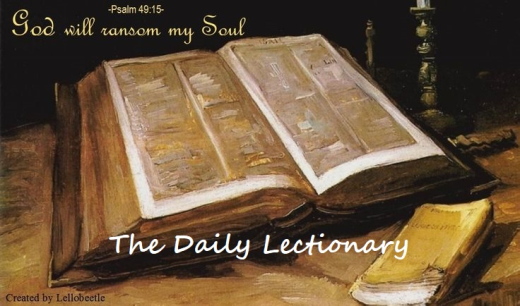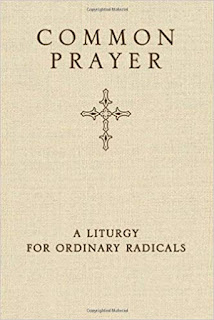 |
| Isaiah 42:1-9; Psalm 36:5-11; Hebrews 9:11-15; John 12:1-11 |
The Daily Lectionary
MONDAY, April 6, 2020 — Monday of Holy Week
(Revised Common Lectionary Year A)
The servant brings forth justice
1 “Here is my servant, whom I uphold,
my chosen one in whom I delight;
I will put my Spirit on him,
and he will bring justice to the nations.
2 He will not shout or cry out,
or raise his voice in the streets.
3 A bruised reed he will not break,
and a smoldering wick he will not snuff out.
In faithfulness he will bring forth justice;
4 he will not falter or be discouraged
till he establishes justice on earth.
In his teaching the islands will put their hope.”
5 This is what God the Lord says—
the Creator of the heavens, who stretches them out,
who spreads out the earth with all that springs from it,
who gives breath to its people,
and life to those who walk on it:
6 “I, the Lord, have called you in righteousness;
I will take hold of your hand.
I will keep you and will make you
to be a covenant for the people
and a light for the Gentiles,
7 to open eyes that are blind,
to free captives from prison
and to release from the dungeon those who sit in darkness.
8 “I am the Lord; that is my name!
I will not yield my glory to another
or my praise to idols.
9 See, the former things have taken place,
and new things I declare;
before they spring into being
I announce them to you.”
Refuge under the shadow of your wings
5 Your love, Lord, reaches to the heavens,
your faithfulness to the skies.
6 Your righteousness is like the highest mountains,
your justice like the great deep.
You, Lord, preserve both people and animals.
7 How priceless is your unfailing love, O God!
People take refuge in the shadow of your wings.
8 They feast on the abundance of your house;
you give them drink from your river of delights.
9 For with you is the fountain of life;
in your light we see light.
10 Continue your love to those who know you,
your righteousness to the upright in heart.
11 May the foot of the proud not come against me,
nor the hand of the wicked drive me away.
The blood of Christ redeems for eternal life
9:11 But when Christ came as high priest of the good things that are now already here, he went through the greater and more perfect tabernacle that is not made with human hands, that is to say, is not a part of this creation. 12 He did not enter by means of the blood of goats and calves; but he entered the Most Holy Place once for all by his own blood, thus obtaining eternal redemption. 13 The blood of goats and bulls and the ashes of a heifer sprinkled on those who are ceremonially unclean sanctify them so that they are outwardly clean. 14 How much more, then, will the blood of Christ, who through the eternal Spirit offered himself unblemished to God, cleanse our consciences from acts that lead to death, so that we may serve the living God!
15 For this reason Christ is the mediator of a new covenant, that those who are called may receive the promised eternal inheritance—now that he has died as a ransom to set them free from the sins committed under the first covenant.
Mary of Bethany anoints Jesus
12:1 Six days before the Passover, Jesus came to Bethany, where Lazarus lived, whom Jesus had raised from the dead. 2 Here a dinner was given in Jesus’ honor. Martha served, while Lazarus was among those reclining at the table with him. 3 Then Mary took about a pint of pure nard, an expensive perfume; she poured it on Jesus’ feet and wiped his feet with her hair. And the house was filled with the fragrance of the perfume.
4 But one of his disciples, Judas Iscariot, who was later to betray him, objected, 5 “Why wasn’t this perfume sold and the money given to the poor? It was worth a year’s wages.” 6 He did not say this because he cared about the poor but because he was a thief; as keeper of the money bag, he used to help himself to what was put into it.
7 “Leave her alone,” Jesus replied. “It was intended that she should save this perfume for the day of my burial. 8 You will always have the poor among you, but you will not always have me.”
9 Meanwhile a large crowd of Jews found out that Jesus was there and came, not only because of him but also to see Lazarus, whom he had raised from the dead. 10 So the chief priests made plans to kill Lazarus as well, 11 for on account of him many of the Jews were going over to Jesus and believing in him.
Optional parts of the readings are set off in [square brackets.]
The Bible texts of the Old Testament, Epistle, and Gospel lessons are from The Holy Bible, New International Version®, NIV® Copyright ©1973, 1978, 1984, 2011 by Biblica, Inc.® Used by permission. All rights reserved worldwide.
The Daily Lectionary is a three-year cyclical lectionary. We are currently in Year A. Beginning with the first Sunday of Advent in 2020, we will be in Year B. The year which ended at Advent 2019 was Year C. These readings complement the Sunday and festival readings: Thursday through Saturday readings help prepare the reader for the Sunday ahead; Monday through Wednesday readings help the reader reflect and digest what they heard in worship. Revised Common Lectionary Daily Readings, copyright © 2005 Consultation on Common Texts. www.commontexts.org
The Daily Lectionary for MONDAY, April 6, 2020 — Monday of Holy Week
Isaiah 42:1-9; Psalm 36:5-11; Hebrews 9:11-15; John 12:1-11









